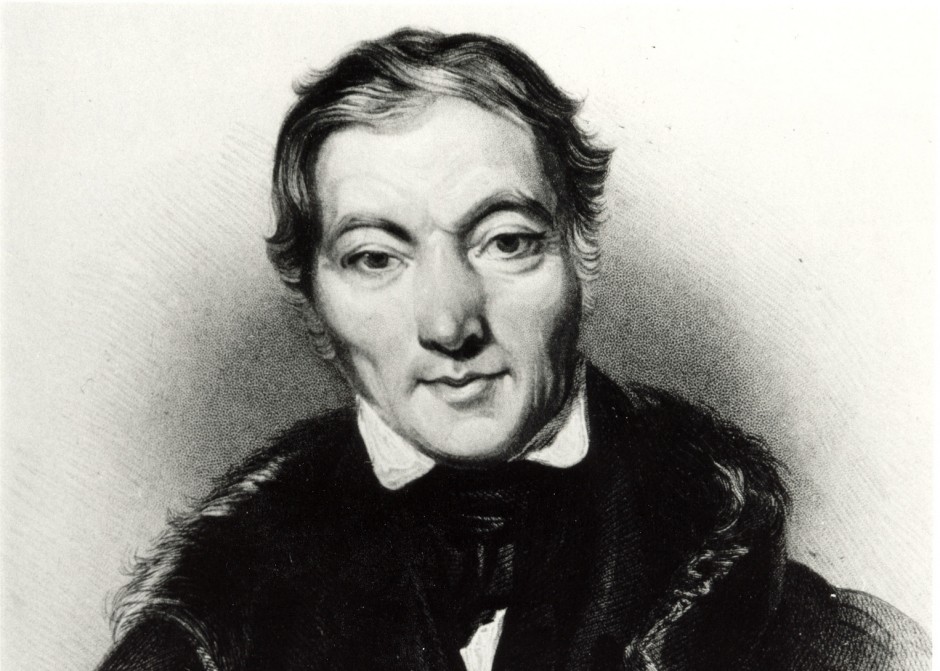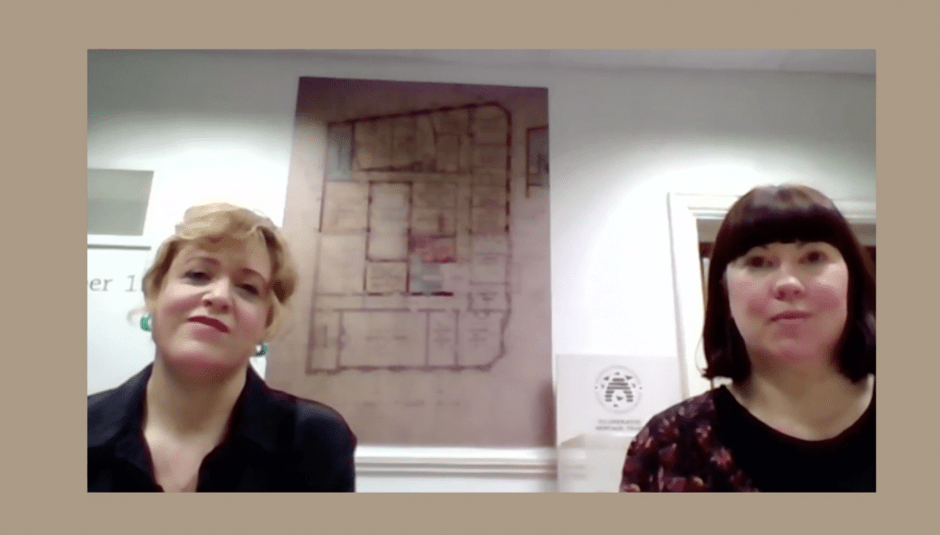When it comes to Robert Owen’s legacy, the co-operative movement is split. Some see the Welsh manufacturer and social reformer as the founder of co-operatives while others attribute that role to the Rochdale Pioneers.
Trust manager Liz McIvor and archivist Sophie McCulloch from the Co-operative Heritage Trust revisited this debate during a session at the conference New Lanark: A living legacy. Held on 1-3 March, the conference celebrated the 250th anniversary of Owen’s birth in 1771.

The session looked at the influence of Owen’s ideas on the Rochdale Pioneers and the wider co-operative movement. While co-op ideas preceded Owen, he brought them back into discussion, said Ms McIvor.
Letters sent by Charles Howarth, one of the founding Pioneers, suggest he had been influenced by Owen’s writing. Howarth wrote the Rochdale Society of Equitable Pioneers’ rule book, which included its objects and its “Law First”.
There were also differences of opinion between utopian communities like Owen’s and those trading with capital, such as Rochdale Society of Equitable Pioneers. “A lot of the utopian communities didn’t survive, whereas consumer co-ops did,” said Ms McIvor.
“People influenced by Owen failed because of in-fighting, they couldn’t agree how things should be run,” added Ms McCulloch.
In the 1830s, Owen was in New Harmony, Indiana, USA, where he attempted to create a utopian community based on “unity and co-operation”. During this time, other communities across the UK tried to set up co-operatives but failed to sustain them. As a result, co-operation became more industrial, separate from Owen. His followers moved from utopian ideas to something more integrated with the economy and social systems through which they lived.
Later, George Jacob Holyoake revived Owen’s influence after getting hold of his letters, which are now part of the Co-operative Heritage Trust’s archives. A co-operator and editor, Holyoake presented Owen as an influential figure within the movement – partly to suit his own purposes of explaining what a co-op is. Holyoake reclaimed the narrative, using what suited the co-op movement at the time to help shape the still developing co-operative identity.

So where should the movement stand with regards to Owen’s legacy?
“He doesn’t need to be the father of the movement, he’s part of the story, of what makes co-op history,” said Ms McIvor. “Because we have Robert Owen’s collection [of letters] and we have George Jacob Holyoake’s collection, both provide context to each other. And we think that actually he’s been able to be used by Holyoake to be more significant throughout history of our movement. He is someone who is used as a cornerstone.”
Owen’s views were controversial during his lifetime, added Ms McIvor, but were rescued and presented back to the movement by Holyoake. And his ideas continue to influence modern worker co-ops, social co-ops and social enterprises.
Owen and co-operative education
Owen also had a huge influence on education in the co-operative movement and in wider society. New Lanark’s Institute for the Formation of Character was one of a number of programmes set up by Owen to provide free education for young people and adults, stating: “It is…the interest of all, that everyone, from birth, should be well educated, physically and mentally, that society may be improved in its character.”
The co-operative movement has placed a similar emphasis on the role of education throughout its history, with education one of the key co-op principles. Although Owenism and co-operativism share a history when it comes to education, this is marked by conflict in ideas and practice.
Professor Tom Woodin explained in his talk on Resuscitating Cooperative Traditions of Education that while “Owenite influences suffused co-operative activities”, there were tensions over the idea of agency. Whereas Owen favoured grand, paternalistic schemes designed on behalf of the working classes, co-operators that came later were more focused on workers taking ownership of these programmes, as reflected in the Rochdale Pioneers’ objectives which state: “This society shall proceed to arrange the powers of production, distribution, education and government or in other words to establish a self- supporting home colony of united interests.”
“The Rochdale Pioneers saw themselves as a very practical group of men”, said Prof Woodin, but their practice was rooted in the utopian ideals of Owen. Both Owen and later co-operators promoted learning in adults and young people as an intrinsic good, but the Pioneers saw education as a pathway to equity.
To demonstrate this point, Prof Woodin shared a quote from Pioneer Abraham Greenwood: “Some approximation to intellectual equality, by the extension to the many of the knowledge and tastes developed amongst the comparatively few, so that a co-operation for common purposes has been rendered possible.”
Early co-operators aimed to distribute knowledge much in the same way they distributed profits, he added.
Lessons from New Lanark
The conference took place at New Lanark, a purpose-built 18th century mill village which, in its day, was one of the largest cotton mills in the UK and the largest in Scotland. It was also a living embodiment of Owen’s utopian socialism, putting into practice his ideas of workers’ dignity, welfare and education. Owen described his work at New Lanark as “the most important experiment for the happiness of the human race that has yet been instituted in any part of the world”. It influenced the co-operative movement too – the village store set up by Owen at New Lanark is said to have laid the basis for the retail co-operative movement birthed in Rochdale.
In his talk, Changing the World One Step at a Time by Example, Prof Morris Altman explored the legacy of New Lanark, with lessons for broader current conversations around sustainability: “When we talk about sustainability, what’s left out of the equation is actually workers and their level of wellbeing.”
Prof Altman said that Owen’s ideas and work around engaging with workers and their families have a lot of implications for contemporary investor-owned corporations as well as co-ops and mutuals. But he stressed that New Lanark was not a co-op, and Owen was not a co-operator: “In New Lanark, workers’ and their families’ wellbeing was very much at the discretion of this paternalistic, yet humanistic, investor-owner.”
The key lesson from New Lanark, said Prof Altman, was that investor-owned firms could be run in a way that treated workers more humanely, and still be financially viable, though this is still a marginal idea in much economic thought. This can be changed by education through business and economic institutions.
Prof Altman talked about the need for “practical utopias” – real-life examples of how doing things differently can work in practice, of which New Lanark is one. “New Lanark is not this weird idea, it’s an example of how we can improve the real world market economy one step at a time. It’s practical, and it should inform economic theory.”
New Lanark – a part of social and co-operative history
New Lanark’s legacy is now preserved in the New Lanark World Heritage Site, which was granted Unesco World Heritage status in 2001. The final day of the conference was dedicated to conversations around the restoration and preservation of New Lanark and other historical sites.
Unesco granted New Lanark its heritage status on several criteria, including that it is “directly or tangibly associated with events or living traditions, with ideas, or with beliefs, with artistic and literary works of outstanding universal significance.”
Unesco adds: “The name of New Lanark is synonymous with that of Robert Owen and his social philosophy in matters such as progressive education, factory reform, humane working practices, international cooperation, and garden cities, which was to have a profound influence on social developments throughout the 19th century and beyond.”
In her presentation on New Lanark and Scotland’s World Heritage, head of archaeology and world heritage at Historic Environment Scotland Dr Rebecca Jones said the site acts as a “milestone in social and industrial history”. Speaking about New Lanark’s relation to the work of Robert Owen and the co-operative movement, she added: “In many ways, across all the sites in Scotland, it’s New Lanark that really embodies the intangible evidenced in the tangible.”
Now and then
The conference explored Owen’s legacy in the context of today’s global challenges, looking at how co-operative solutions could help to address issues such as climate change and inequality.
Ed Archer, chair of the Lanarkshire Heritage Forum Archaeology, said that while not all of Owen’s endeavours were “a startling success”, important lessons could be learnt from his New Harmony or Orbiston projects.
“What he did was to sort of trail blaze and inspire other people,” he added. “I think there’s a lot of need these days for working in a co-operative sense and to have more ethically directed businesses whether it is your Scotmid supermarkets and stores or energy.”
Martin Meteyard, a co-op development consultant in Scotland, said that Owen had “a vision of a new society, one based on human dignity and equality” which he kept alive and in front of everything he did.
“He emphasised the necessity of education … he emphasised practical endeavour. To own his legacy the co-operative movement added democracy, which wasn’t necessarily one of his strengths, he was a bit dismissive in later years of the abilities of ordinary working people to take charge of affairs themselves.
“But despite Owen’s opinions, the co-operative movement in the UK and elsewhere showed that it was possible for ordinary working people to come together and to achieve huge strides to a more, a new mode of existence under their own control.”
Mr Meteyard added that Owen’s approach could serve as an example for co-ops. Today’s challenges may be different from those of Owen’s days, but co-ops can still be involved in transforming human society in a positive way, he added.
Issues co-ops can aim to address could include promoting racial justice, gender equality, LGBTQ inclusion, or engaging with your people, said Mr Meteyard.
“To go back to Robert Owen, he said, to reiterate, precept upon precept, however excellent, without decisive measures, to put them into practice, is a waste of time. It is far more necessary to act than to speak,” he added.